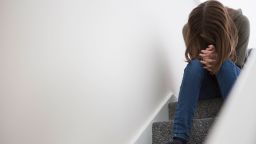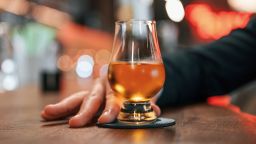Editor’s note: Dr. Jill Grimes is author of “The Ultimate College Student Health Handbook: Your Guide for Everything From Hangovers to Homesickness.” Grimes has more than 30 years of experience in private practice and academic medicine, and she shares her medical wisdom on social media platforms such as The College Doc.
Is it safe to drink alcohol while taking antidepressant medications? What about using weed? What will happen if I skip a dose of my medicine so I can drink at a party? Are any over-the-counter meds off-limits if I get sick?
As a family physician focused on college health, I get asked these questions all the time. The high-stress atmosphere and dense living quarters on college campuses often create the perfect storm for potential health complications. Sleepless nights, substance use and rampant respiratory viruses make it important to understand how these medications interact with daily habits and illnesses.
More than one-third of college students today suffer from moderate to severe anxiety and depressive symptoms, according to the 2023-2024 Healthy Minds Study, and it’s good that many are getting help. About 1 in 5 college students, or 22%, report taking prescription antidepressants within the preceding year, the study found, and about 1 in 3 students, or 36%, has received professional counseling.
At the same time, students are studying all night, shifting their sleep schedules to balance different class times, going to weekend parties and more. Those parties tend to serve alcohol, and social and even binge drinking is part of college culture. All-day tailgates increase the chance of excessive intake, even for those who are trying to drink in moderation.
The best medical recommendation is, of course, to avoid alcohol and drugs while taking a prescription antidepressant. Ideally, students on those medications should also attend counseling, get consistent sleep and commit to good nutrition and daily exercise to improve their mental health.
But these are not always easy to do at college. So, here’s what you need to know about combining your legal antidepressant prescriptions with other substances.
What’s the difference between anti-anxiety and antidepressant meds?
Traditional anti-anxiety medications were sedatives (benzodiazepines), which certainly reduce immediate anxiety but can quickly become physically addictive. Today, doctors have many alternative medication choices with little or no addictive potential.
The treatment of choice for most anxiety disorders is either a selective serotonin reuptake inhibitor, or SSRI, or a serotonin and norepinephrine reuptake inhibitor, or SNRI. These medications typically must be taken every day to be effective.
Beta-blockers, such as propranolol, are blood pressure medications that may be used in low doses to slow your heart rate, which directly calms physical symptoms of stress and indirectly leads to mental relaxation. Hydroxyzine is a prescription antihistamine that calms anxiety through sedation. These two medications may be taken “as needed.”
SSRIs and SNRIs raise neurotransmitter levels in the brain and have proven clinical efficacy in treating both anxiety and depressive disorders, but they are categorized as antidepressant medications.
Interestingly, many people have a bias against taking an antidepressant but are fine with taking a prescription medication for their anxiety. That’s why it’s important to clarify what we are treating.
How does alcohol affect anxiety and depression?
First, remember that alcohol is a sedative, a central nervous system depressant. Yes, you may feel initially stimulated as it floods your brain in a bath of short-term dopamine, serotonin and gamma-aminobutyric acid, or GABA, release, but the subsequent drop in neurotransmitter levels can depress your mood and make you more likely to experience negative intrusive thoughts, anger and anxiety.
Students often think alcohol improves their sleep, because it makes them feel sleepy and fall asleep more quickly. However, alcohol disrupts your sleep quality by reducing the restorative rapid eye movement, or REM, sleep and increasing awakenings, thus leaving your brain more tired and prone to emotional distress.
Alcohol obviously impairs your judgment, which can lead to embarrassing, damaging or dangerous actions, conversations and drunk texting.
How does alcohol interact with antidepressants?
Antidepressant medications work by slowly and steadily building up neurotransmitters such as serotonin and dopamine. Drinking alcohol, which ultimately depletes these chemicals, therefore creates more work to improve your mental health, which is the primary reason not to drink while taking antidepressants.
Antidepressants can greatly magnify the effects of alcohol, creating more central nervous system depression, increasing sedation and further impairing your judgment, reaction times and coordination.
Many people find their alcohol tolerance is greatly decreased while taking these meds.
OK, but can I have an occasional drink?
No doctor, including me, is ever going to recommend drinking alcohol while taking antidepressants. However, the medical risks of having one or possibly two standard, measured drinks a couple times per month are low in otherwise healthy young adults on SSRIs or SNRIs and not taking additional medications.
However, the typical college drink freely poured into a cup is more than two standard drinks, and the impaired judgment from one drink often leads to a second drink despite initial intentions to stick to one.
That’s why I answer “maybe.”
The major exception to this low risk is monoamine oxidase inhibitors, or MAOIs, which must never be mixed with alcohol because they can cause a serious, potentially fatal sudden spike in blood pressure. MAOIs are a unique class of antidepressants typically only used in patients who have not responded to other treatments.
What is the worst thing that will happen if I drink too much?
The worst thing is death from alcohol toxicity. A far more common problem is seizures. Antidepressants slightly lower your seizure threshold, meaning it’s easier to have a seizure. Alcohol by itself can cause seizures, and combining it with these medications increases your risk.
How about if I skip my medication on days I want to drink?
Absolutely not. Antidepressants don’t go into and out of your system in a few hours. It takes many days or weeks. Skipping a dose will not decrease your risk of interaction with alcohol and may result in you having headaches, nausea and increased anxiety or flu-like symptoms from antidepressant discontinuation syndrome.
What about weed?
Like alcohol, the immediate effect of cannabis tends to be mood-elevating or calming, which leads many students to self-medicate with these products. The social ease and discretion of vaping or consuming edibles (compared with alcohol) makes it tempting to over-rely on quick hits throughout the day. Doing so may contribute to the addictive potential, especially in people younger than 25. An estimated 10% of adults who use cannabis will become addicted, according to the US Centers for Disease Control and Prevention.
Inconsistent THC concentrations and unique individual responses can allow even a single dose to randomly cause increased anxiety, paranoia, irritability and/or nausea. Illegally produced THC products may be spiked with other psychoactive substances.
Cannabis affects liver enzymes, causing higher blood levels of antidepressants with subsequent increased side effects, according to a 2021 study in the Journal of Personalized Medicine. And obviously, there are legal issues depending on which state you live in and how old you are.
Why do cold medications have warnings against antidepressants?
They’re legal drugs, strictly regulated by the US Food and Drug Administration. Every over-the-counter medication label must include warnings about significant drug interactions.
In this case, there may be a risk of serotonin syndrome, which is a rare but serious drug reaction typically caused by multiple medications and other substances interacting to raise serotonin levels abruptly.
What medications raise serotonin? Antidepressants, migraine and anti-nausea medications, street drugs, herbal remedies and dextromethorphan increase serotonin. Cold medications get their warning because they typically contain dextromethorphan to help suppress coughs.
Although an increase in dosage of any one serotonin-elevating medication can trigger serotonin syndrome, the most common scenario is someone who regularly takes two or more of these medications (especially at higher doses).
If you’re taking any of these medications and want or need to add one more, talk with your doctor’s office or pharmacist before adding it.
The bottom line
Maybe your antidepressant doesn’t feel like it’s helping enough, so you supplement with other substances. Instead, please consult with your doctor about increasing your dose, changing prescriptions or pairing with a supplemental drug to increase efficacy.
And if you’re having to perform mental gymnastics to guess whether you can mix partying and your daily medicine, that’s a good sign you should skip the alcohol or THC in favor of your prescription.










